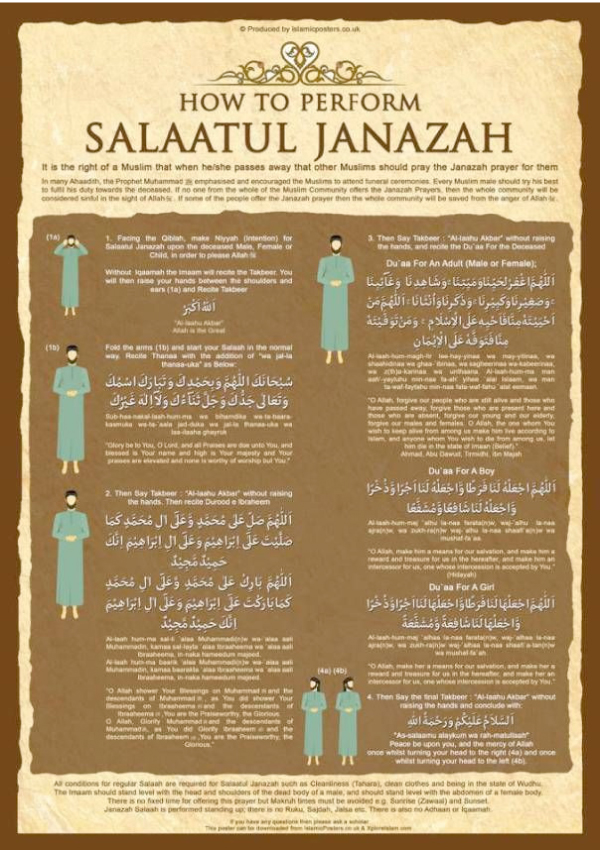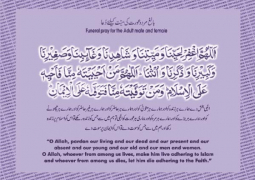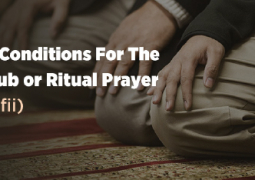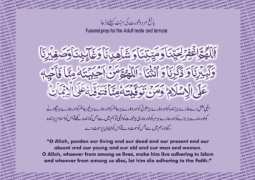
A: Persons for Whom Funeral Prayer is to be Offered
There is a consensus among the jurists that funeral prayer is offered for all Muslims, male or female, and young or old. Ibn Al-Munzhir said: “The scholars are in agreement that if it is established that an infant is born alive, that is, by his crying, sneezing, or moving etc., then, if it dies, a funeral prayer should be offered for it.”
Al-Mughirah ibn Shu’bah reports that the Prophet, peace be upon him, said: “One may ride one’s mount behind the funeral, and walk on foot a little ahead of it or to its right or left. A funeral prayer should be offered for an aborted baby, seeking for his parents the mercy and forgiveness of Allah.” This is reported by Ahmad and Abu Daw’ud. Another narration reads: “A person on foot may walk behind a funeral, or ahead of it, or on its left side or right side or still nearer to it.” According to another report, “A rider should ride behind the funeral, whereas one on foot may walk anywhere. And a funeral prayer should be offered for a child.” This is reported by Ahmad, Nasa’i, and Tirmizhi, who consider it a sound hadith.
B: Funeral Prayer for an Aborted Child
A miscarried fetus, less than four months old, may not be washed, nor may a funeral prayer be offered for it. It should be wrapped in a piece of cloth and buried. The majority of jurists are in agreement on this point. On the other hand, if a miscarried fetus is four months old or older, and the existence of life in it is established, then there is a consensus that it should be washed and a funeral prayer offered for it. But if its life is not established by its movements or other evidence, then according to Malik, Al-Awza’i, AlHasan, and the Hanafi School, funeral prayer may not be offered for it. They base their opinion on a hadith transmitted by Tirmizhi, Nasa’i, Ibn Majah, and Al-Baihaqi on the authority of Jabir that the Prophet, peace be upon him, said: “If in a miscarried fetus life is established by its movements, a funeral prayer should be offered for it, and it is entitled to its share of inheritance.” According to this hadith offering a funeral prayer for a miscarried fetus is conditioned upon proof of its life evident in signs of life, such as its movement, etc. Ahmad, Sa’ id, Ibn Sirin, and Ishaq are of the opinion that in the light of the above hadith, a miscarried fetus may be washed and a funeral prayer may be offered for it. The words used in this hadith are “a funeral prayer should be offered for a miscarried fetus” because it has a soul and is alive. The Prophet, peace be upon him, informed us that a fetus receives a soul when it is four months old. Others refute this argument with the assertion that there is confusion in the chain of narrators of this hadith, and besides, a stronger hadith contradicts it. But this alone does not constitute a valid argument.
Funeral Prayer for a Martyr
A martyr is one who is killed in a battlefield fighting the enemies of Islam. All the hadith on this subject are quite explicit that no funeral prayer may be offered for a martyr. Bukhari has narrated from Jabir that the Prophet, peace be upon him, ordered that the martyrs of the battle of Uhud be buried while they were still bleeding. He neither washed them nor offered a funeral prayer for them. Ahmad, Ahu Daw ‘ud and Tirmizhi reported that Anas said: “The martyrs of Uhud were not washed. They were buried with their wounds unwashed, and no funeral prayer was offered for them.” There are, however, some hadith that are equally explicit and state that a funeral prayer should be offered for martyrs. Bukhari reported from ‘Uqbah ibn ‘Amir that one day the Prophet, peace be upon him, went out and offered a funeral prayer for the martyrs of Uhud, eight years after their death, as if he were bidding farewell to both the living and the dead.
Abu Malik Al-Ghafari reported: “The bodies of the martyrs of Uhud were brought in batches of nine and placed with the body of Hamzah, who served as the tenth. Then the Prophet, peace be upon him, offered a funeral prayer for them. After that the nine bodies were removed leaving Hamzah undisturbed. Then a batch of another nine martyrs was brought and placed beside Hamzah. The Prophet, peace be upon him, offered a funeral prayer for them as well. This way the Prophet offered funeral prayer for all of them. This hadith has been narrated by Al-Baihaqi, who says: “This is the soundest hadith on this subject. It is, however, a mursal hadith. (Mursal: A hadith that rests on a chain of authorities going no further back than the second generation after the Prophet (peace be upon him).
The difference in the narrations in these various hadith has led jurists to differ on this matter. Some take all of them together, while others prefer some narrations over others. Ibn Hazm holds that either-- offering or not offering (funeral prayer for the martyrs)--is permissible. It is alright whether or not a funeral prayer is offered for the martyrs. In one of his statements Ahmad has also expressed a similar view. Ibn al-Qayyim approves of this view and says: “The correct position in this regard is that one is given a choice whether or not to offer a funeral prayer (for a martyr), because there are reports in favor of both positions.” This is the opinion also of Ahmad, and he is the proper person to describe the principles of his school. He says: “What is apparent from this is that no funeral prayer was offered for the martyrs of Uhud before burying them. There were seventy people who fell martyrs in that battle, and any funeral prayer for them could not have taken place in secret.” The hadith reported by Jabir ibn ‘Abd Allah that the Prophet, peace be upon him, did not offer funeral prayer for these martyrs is sound and very explicit. Jabir’s father was among those who were killed that day, and he knew what few besides him knew. Abu Hanifah, Al-Thawri, Al-Hasan, and Ibn Al-Musayiyaib, however, are inclined to the reports stating that the Prophet, peace be upon him, did offer funeral prayer for the martyrs. They hold that a funeral prayer must be offered for martyrs. However, Malik, Ash-Shafi’i, Ishaq, and, according to one report, Ahmad, prefer the reports that say no funeral prayer is to be offered for martyrs. Ash-Shafi’i in his Kitab al-Umm writes: “All reports received concerning this subject are sound and show that the Prophet, peace be upon him, did not offer funeral prayer for the martyrs of Uhud. Those who report that he offered funeral prayer for them and said seventy takbirs for Hamzah are not correct. Those who turn away from these sound hadith should be ashamed of themselves. The hadith reported by ‘Uqbah ibn ‘Amir also states that the Prophet, peace be upon him, did so eight years after their death, as if he were bidding them farewell. This does not constitute abrogation of an established practice. (See Al-Umm. by Ash-Shafi’i)
A Person Surviving a Battle but later Dying of Wounds
If one is wounded in a battle, but survives, remains in a stable condition for a while, and then dies, he should be washed, and a funeral prayer should be offered for him, even though he may be a martyr. The Prophet, peace be upon him, washed Sa’d ibn Mu’azh, and offered a funeral prayer for him, after he died of his hand wounds. Sa’d was taken to the mosque, where he remained for a few days, and then he died as a martyr because of his infected wound. If on the other hand, a wounded fighter does not survive in a stable condition, or he just talked or drank water and thereafter died, he is not to be washed or offered a funeral prayer. The author of Al-Mughni states: “It is recorded in Futuh Al-Sham, that a man said: “I took some water to give a drink to my cousin if he were still alive after some injuries in the battle. On the way, I passed by Al-Harith ibn Hisham, who was also wounded in the same battle. I wanted to give him a drink, but he noticed that another wounded man was looking toward him for a drink. At this he pointed that I should first give this man a drink. I went toward him to give him a drink, but he also found another man looking to him. So he gestured that I should first give him the drink. Thus they all died. None of them was washed or offered a funeral prayer although they all died after the battle.
To be continued
Read Other Articles In Muslims Hands




